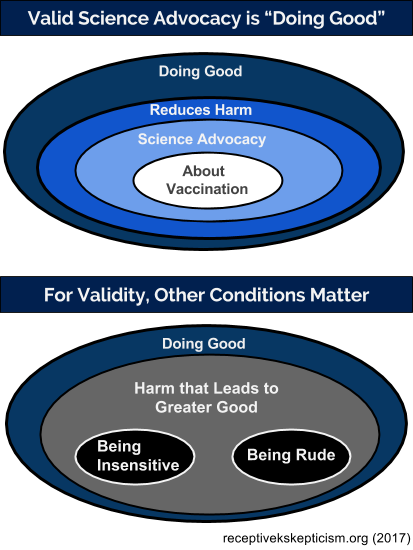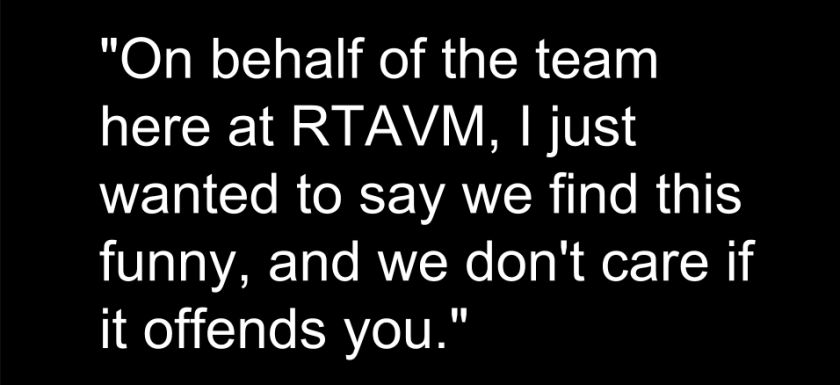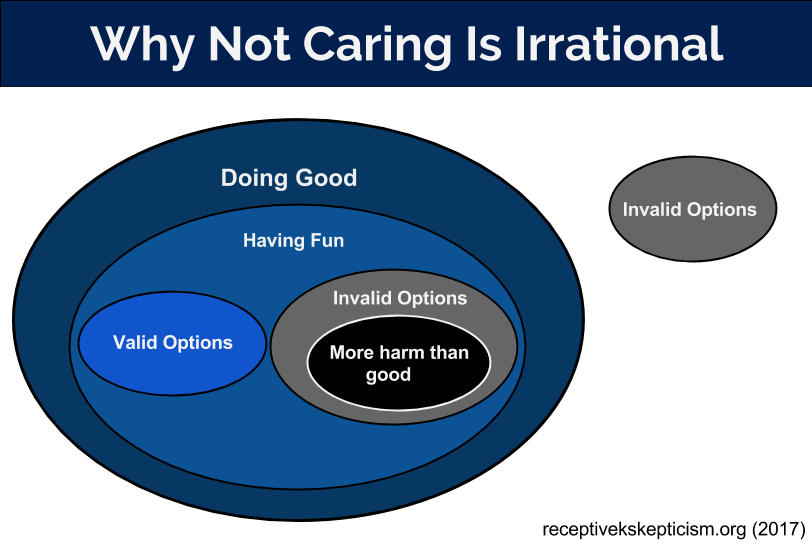RtAVM looks to have violated one of their own rules (5), with their handling of the sexy swearing Jesus meme. I’m not a theist, so I’m desensitized from being personally offended by it. My first thought was about how funny a major mistake in the meme was. The crown of thorns is horrible for anyone, but but who would put that on a baby? And in 2017, with all the great memes out there, a swearing Jesus or a sexy Jesus needs something else to really be funny. It’s definitely not something I would call a hill to die on for the sake of humor. It’s pretty middle-of-the-road as far as funny goes. But then I noticed this being said: “On behalf of the team here at RTAVM, I just wanted to say we find this funny, and we don’t care if it offends you.”
Not Just A Joke
I saw allies in a common cause respond negatively to the RTAVM team’s essentially belligerent behavior as they told these allies of the pro-vaccine movement “we don’t care”. People brought up legitimate reasons to oppose this, only to be given the brush-off. For example:
“as a Christian vaccination nurse I want you to know that this is beyond distasteful and will not help change anyone’s mind.
RtAVM response:
The page admins repeatedly hit back with how the meme was just a joke, and people who couldn’t take it were the problem. Except that when something is a sensitive subject for someone, it’s tactless to flippantly make jokes about, and it’s generally rude. If a parent says “my baby daughter/son is so beautiful” and we find this factually incorrect, due to symmetry issues and whatnot, it isn’t okay to make jokes about how unattractive the child is in the presence of the parent. It’s generally unkind to insensitively characterize things that matter to people, like faith, while around them. If you are asking why that matters, the answer is your epistemology is likely flawed, as will be explained further on.
Why The Rule Looks Violated
Let’s compare this to their rules:
“We all come from different walks of life and everyone that visits here, we want to treat with equal respect in that aspect.” (Granted, rule 6 has a line about not walking on eggshells). But between the line of not walking on eggshells, and “avoiding disrespect toward religions by not having any kind of religious debate”, this situation veered over into rule 5 violation by far. That’s because rule 5 is clearly about mutual respect. RS promotes opposition without disregard. We strongly believe that if a person sees religion as harmful, they should be able to make their case about it. But the unhealthy difference between that and the actions of RtAVM that there is no mutual respect when there’s total insensitivity. I’m betting that there’s a good reason this rule was originally made. It’s because allies are needed, and not just atheists are going to get the job done. Even if they are right about being entitled to commit sacrilege, it still is disrespectful to be insensitive to people who experience it as harmful.
Science Advocacy is Governed By Doing Good
The flaw I believe is here, is that they lost sight of their underlying purpose, probably due to poor self-awareness, leading them to lose the ends behind their means. In rule 6, they indicate that they are here to have fun while they debunk memes. But let’s explore that in the context of the stated purpose, and ask “Why are they debunking memes?”. Although the ends seem to have been lost in the means for them, the answer is that it all boils down to trying to do good. Somewhere in there, I would argue based on logic pointed out more clearly in the last blog, an initial motive has appeared to go off the rails as the means to the base purpose of doing good got lost in the doing of good.
If you are:
- Doing vaccine advocacy
- Which is a type of science advocacy
- Which is a type of reducing harm
- Which is a type of doing good
______________________________
then for all of your actions to that end to be rationally goal-congruent,
all of your actions to that end should be for a greater good.If you are not doing good, based on valuing good as better to bring about, what are you trying to do with debunking memes? Is it to show why something is wrong? Why does that matter without “good”? I would contend it all boils down to doing good, and diagrams can help reveal why even more clearly. Venn diagrams show the effect of nested conditions in ways thinking about them isn’t always clear. Euler diagrams help show when something is not an option. Logic diagrams like Venn and Euler set and subset are easier to keep track of. We can show why certain logic is flawed more easily this way.

To be rude or insensitive, and your action to be rational, for validity, it requires that this harm leads to greater good. If it can be shown why it doesn’t, then the action is not justified. How limited our knowledge and perspectives are creates the need for ongoing reevaluation as new info comes in. This should show why the “I don’t care” attitude is irrational. Having some fun while you try to make the world a better place is good. But if your fun is at the expense of how others feel, and you turn a deaf ear to feedback about that, (especially about something in the category that was given the name sacrilege), then the odds are you have lost your way and purpose and are acting in an illogical manner. So even if it were not in their rules (it is), this is still a relevant issue for concern.
Invalid options are at every nested criteria level, so this is just for visualizing this where it matters most to see. But when we look at considerations concerning:
- Doing good
- within “having fun”
- And valid options
_________________
Then doing more harm than good isn’t a valid option.Visiting the page comments, to everyone raising concern, the RtAVM response is “I don’t care”. I’d say that’s because their epistemology is flawed. They don’t care, because I’d contend they trapped themselves in the labyrinth of means, and lost the end about doing good. They don’t care, because that not caring is a symptom of their error. Not caring doesn’t have to be directly irrational, as they may have reasons for not caring. But it’s likely a reason that was irrationally justified.
Conclusion
In closing, these actions from RtAVM are from the mentality Carl Sagan warned us about in his book, “The Demon Haunted World”:
“The chief deficiency I see in the skeptical movement is its polarization: Us vs. Them — the sense that we have a monopoly on the truth; that those other people who believe in all these stupid doctrines are morons; that if you’re sensible, you’ll listen to us; and if not, to hell with you. This is nonconstructive. It does not get our message across. It condemns us to permanent minority status.”
Let’s raise the standards of who we want out there on the forefront. How can closed-mindedness be considered a good thing in the advocacy of science? How are they modeling the rational open-mindedness we want interlocutors to have toward us? That’s what we should be thinking about.
John Kelly (Author)
Gianpaolo Merello Garbarino (Copy Editor)
Receptive Skepticism (2017)

